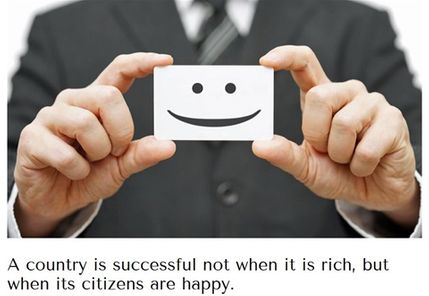6. Sep, 2020
Lykke - A country is successful not when it is rich, but when its citizens are happy
I heard about Lykke (pronounced LOO-ka),Wiking decided to investigate why Denmark consistently ranks number one in every happiest citizens polls. Lykke is the Danish word for happiness. The author of The Little Book of Lykke, Meik Wiking, is the CEO of the Happiness Research Institute in Copenhagen and the author of The Little Book of Hygge in which he encourages people to explore the concept of everyday happiness and comfort. In his new book about Lykke, he explores what makes people happy.
Mr. Wiking traveled the globe to find the secrets of the happiest people. While the Danes top the World Happiness Rankings, they do not have a monopoly on happiness. His goal was to discover what makes people in other countries and cultures happy and how happiness and improved quality of life can be spread across the world. The Little Book of Lykke is the result.
Wiking identifies six factors that explain the majority of happiness around the world – togetherness, money, health, freedom, trust and kindness. People’s contentment with their lives can deepen with some shifts in perspective and actions. We don’t all have to move to Denmark. This book is filled with ideas and suggestions to help people become more satisfied with their lives.
For example, he loves the culture and ritual the French have around their food. They use mealtimes as opportunities to socialize with each other and be together. The French spend twice as long eating meals as people in the UK, and have lower obesity rates and a longer life expectancy. Another example is how much exercise the Danes get which he feels impacts their happiness. 50% of all working Danes ride a bicycle to and from work every day, so they have built in their exercise. Finally, one of his favorite happiness ‘tips’ comes from Bhutan. The school day begins in Bhutan with a mindfulness exercise called ‘brain brushing’. This has been linked to higher levels of academic performance and well being. The Royal Government of Bhutan has made Gross National Happiness (GNH) their vision for their country.
Wiking in his book talks about the common good and being able to rely on one another in times of need. Danes feel that there is a link between the good life and the common good. Their taxes are very high, but nine out of ten Danes are happy to pay because they feel they have a very high quality of life and that they will be supported if they ever have a time of need. In Denmark, there are no college/university fees, and students receive $790 (after tax) from the government monthly. Men and women get equal parental leave and there is universal health care. They believe in a strong sense of community. Wiking researches the importance of knowing your neighbors and describes communities in Denmark that are built with shared facilities so that villages are literally raising all their children together. He offers suggestions on how we each can turn our street into a village, get to know our neighbors, and build community.
In the World Happiness Reports from 2013 – 2017, Denmark ranks number one with a score of 7.57 out of 10. The United States ranks number 11 with a score of 7.07. According to Harvard professor Robert Putnam in a 2000 book called Bowling Alone: The Collapse and Revival of American Community, Americans are engaging less in their communities and their happiness is decreasing. Americans have become disconnected from family, friends, and neighbors. We tend to volunteer less, attend church less, and know our neighbors less. Our civic engagement has decreased dramatically, and a strong democracy depends on involved and connected citizens. We trail most developed countries in voter turnout.
Many studies have shown that people who have strong social contact live longer. People want to be with other people, but the trend is going the other way. Technology has not helped this problem because it can isolate people. Developed countries, specifically South Korea, also suffer from being richer, but not happier. South Korea’s rise to riches has been dramatic, but it ranks 55th in the World Happiness Report, and has top ranking in suicide rates in OECD (Organization for Economic Cooperation and Development) countries. The inequality in the U.S. between the haves and the have-nots is worrisome for our future. If a country doubles in wealth but 90% of that wealth goes to the richest 10%, that is not growth, that is greed.”
Explore ideas for the rebuilding of trust, kindness, togetherness, empathy, and community good. It will not shock you to learn that New York City ranks absolutely last in how often people smile at each other on the street! I love the reports from Silicon Valley that the tech companies are so responsive to the happiness of their employees. They provide areas for recreation, day care, some provide pet care, good paternal and maternal leave and bonding opportunities. It is said that Steve Jobs built the new Apple headquarters with collaboration and openness in mind.
